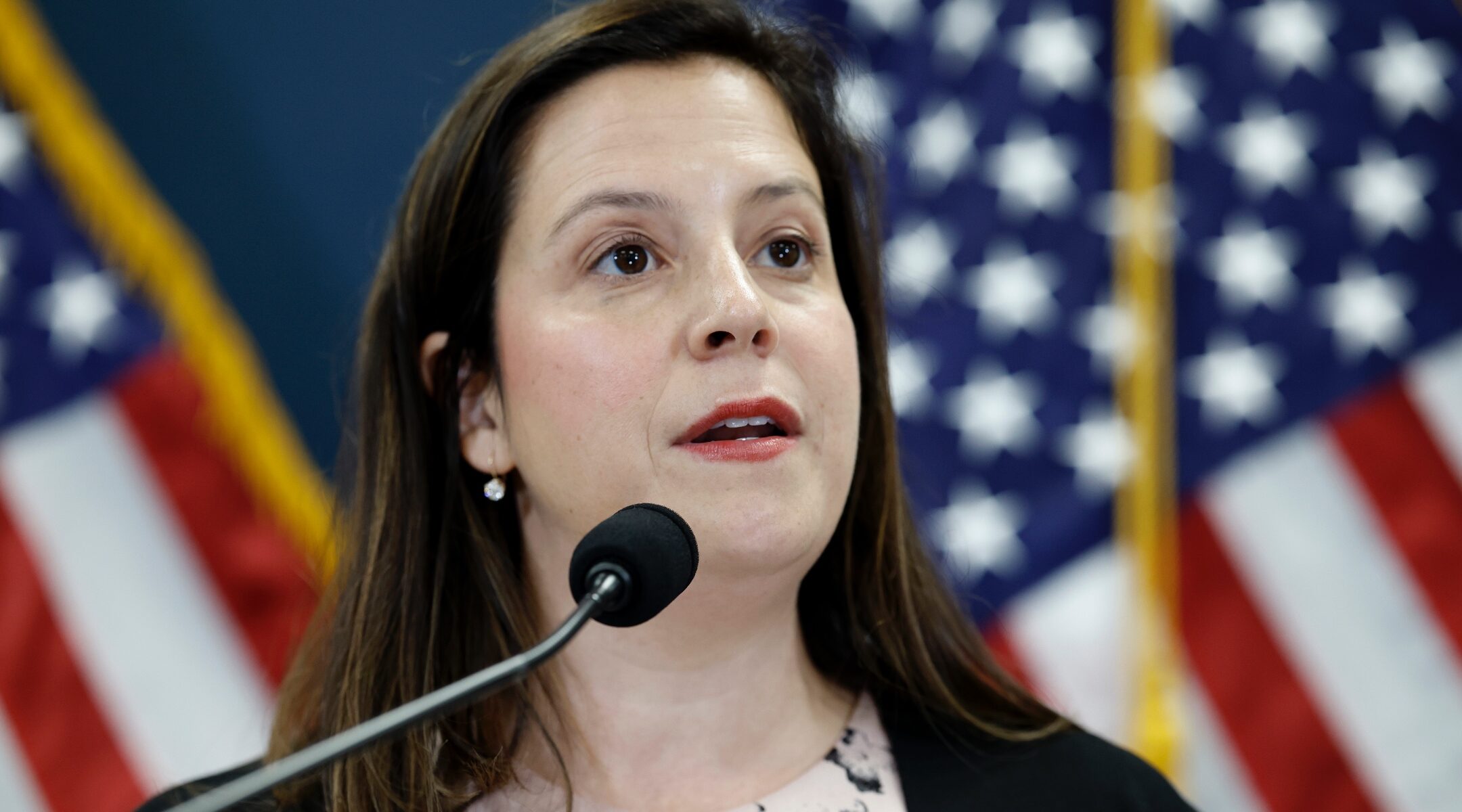WASHINGTON (JTA) — Over the weekend, one Jewish Democratic congressman joined with Elise Stefanik, the number-three Republican in the House of Representatives, to demand accountability for antisemitism.
Another took to cable TV to say she had no credibility on the issue.
The gap between the two Jewish Democrats — Florida’s Jared Moskowitz and Maryland’s Jamie Raskin — illustrates a broader dilemma for liberal Jews. Moskowitz joined with Stefanik to demand that three elite universities fire their leaders for failing to protect Jews on campus, while Raskin told MSNBC that Stefanik is a leading enabler of antisemitism because she has echoed a conspiracy theory that has fueled antisemitic violence.
The split on Stefanik stems from a congressional hearing last week in which she asked the presidents of Harvard University, the Massachusetts Institute of Technology and the University of Pennsylvania if “calling for the genocide of Jews” is against the universities’ codes of conduct. All three, weighing campus conduct codes against free speech imperatives, said the answer depended on the context. In the ensuing outrage, Penn President Liz Magill stepped down and pressure built on Harvard’s Claudine Gay to do the same.
For some, Stefanik emerged from the meeting as an unexpected champion of the fight against antisemitism. Moskowitz said in a Fox News interview that Stefanik “did a great job” questioning the university presidents and signed a letter demanding their resignations.
In the past, however, the upstate New York Republican has drawn condemnation for comments echoing the white supremacist “great replacement theory,” which in its original form claims that Jews are orchestrating the mass immigration of people of color into Western nations in order to replace their white populations. In 2021, Stefanik’s campaign posted on social media that Democrats plan to “overthrow our current electorate” by allowing undocumented immigrants to enter the country.
That statement by Stefanik has placed some Jews in an ambivalent spot: surprised to find themselves cheering her on.
“I felt very strange, kind of like rooting her on when she was asking her questions,” recalled Jewish philanthropist Lisa Greer. “I just thought ‘this is really amazing.’ And then I kept thinking, well, it looks like Elise Stefanik, but is that really her? I couldn’t believe it was the same person.”
Betsy Sheerr, a Democratic donor and a philanthropist who has given to multiple Jewish and pro-Israel causes, said she appreciated Stefanik for getting results.
“I think that she said what a lot of us were thinking when we listened to the testimony, to be honest, and as harsh as she was — she was really grilling them — I think a lot of us watched that and said you know, that’s absolutely right, this is unacceptable, this is ridiculous, this is cowardice,” Sheerr said from Israel, where she was on a solidarity tour. “So you know in that way I would have to begrudgingly admit that she shone a light and there were results that might not have happened without the directness of her grilling people.”
Raskin, speaking Sunday on MSNBC, said that Stefanik’s enabling of antisemitism in her party disqualified her from any role in combating antisemitism on campus.
“Where does Elise Stefanik get off lecturing anybody about antisemitism, when she’s the hugest supporter of Donald Trump, who traffics in antisemitism all the time?” Raskin said, according to an account in The Hill. He added that she “didn’t utter a peep of protest” when Trump dined a year ago with Kanye West, the rapper who embraced antisemitism, and Nick Fuentes, a Holocaust denier.
Stefanik responded on X that Trump was “the best friend Jewish people have had in the White House in modern times.” She listed a number of Trump’s Israel policies, such as moving the U.S. embassy to Jerusalem, as well as his 2019 executive order on antisemitism.
Stefanik’s past actions did not deter the country’s leading antisemitism watchdog from sharing video of the congressional hearing. In 2022, after a mass shooting in Buffalo inspired by the “great replacement” theory, the Anti-Defamation League criticized Stefanik as on of its propagators, saying her campaign’s posts “strategically play on extremist rhetoric to stoke growing fears that white Americans are under attack and minorities seek to eject them.”
Yet its CEO, Jonathan Greenblatt, posted a video the day of the hearing that starred Stefanik. “These leaders’ lack of moral clarity in response to this line of questioning is shameful,” he said on X, formerly Twitter.
Greenblatt and Stefanik did not return requests for comment.
Amy Spitalnick, the CEO of the Jewish Council for Public Affairs, said Stefanik could not disentangle antisemitism from the left, which Stefanik repudiates, from antisemitism on the right, which Stefanik ignores.
“It’s important to understand how deeply connected all of this antisemitism is, they are all rooted in conspiracy theories around Jewish control and power,” said Spitalnick, who played a leading role in successfully suing the neo-Nazi organizers of the deadly Charlottesville march, who chanted “Jews will not replace us.”
“By normalizing great replacement and related extremism, there’s this horseshoe effect where it inadvertently or intentionally fuels the idea that Jews have outsized power and control,” Spitalnick said. “And it all comes back in a way that is deeply dangerous not just for the Jewish community, but for everyone.”
What bothers Sheerr was her gut instinct that Stefanik would not walk back her own incendiary comments from 2021, or more robustly confront antisemitism in her own party. She noted that Stefanik started out as a moderate, and is now a loyalist of Trump — who also has peddled versions of the “great replacement” theory.
“She has really turned into one of the propagators of some of the vilest antisemitism,” Sheerr said. “She doesn’t call out anybody in her party, or anything, whether it’s for [peddling the] dual loyalty trope, or any of the other tropes, so I think she has done a service in a way but she’s a very dangerous member of Congress.”
Greer also wondered whether Stefanik would budge on her earlier views. “The best thing I can say about this is I wish in a perfect world she would have changed, she would say ‘I don’t believe that,’ and she would use that voice for good. That would be a wonderful thing,” she said. “But I have no sense that that’s going to happen.”
Others are more optimistic. Esther Panitch, a Democratic representative in the Georgia state legislature who has been outspoken in confronting anti-Israel sentiment in her own party, said she hoped that part of what spurred Stefanik to take the lead in confronting the university presidents was the lessons she learned from her flirtation with the great replacement theory.
“It seems she’s educated herself since the comments last year,” Panitch said in an interview. “I’m hopeful that’s what happened, and that she wasn’t trying to score a few points. I’m appreciative of what she did.”
Meanwhile, Rep. Kathy Manning, a Jewish North Carolina Democrat, accused Stefanik of acting in bad faith after she appeared to have copied sections of a letter written by Manning that criticized the college presidents. Manning posted two letters on Twitter, hers and the one Stefanik and Moskowitz authored. The first three paragraphs were identical and Manning said Stefanik had plagiarized her. “Rep. Stefanik is trying to get a sound bite and media hits,” she said.
Stefanik replied on X, formerly Twitter, that she made changes to the letter and then circulated it to Republican members. She accused Manning of “trying to do a hit piece to help panicked Democrats who are clearly on the wrong side of history protecting these university presidents.”
JTA has documented Jewish history in real-time for over a century. Keep our journalism strong by joining us in supporting independent, award-winning reporting.






